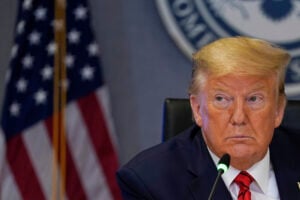[ad_1]

(Photo by Evan Vucci-Pool/Getty Images)
Last week, Donald Trump finally got around to asking the court to excuse him from posting bond in the E. Jean Carroll defamation case. His lawyers spent almost four whole weeks after the jury rendered its $83 million verdict thinking up reasons that their client should be able to fend off collections without fronting the cash, and literally the best they could come up with is “our guy is so rich, that there’s no need to make him put up the money.” (Slight paraphrase.)
They also added in some wishcasting about the likelihood that Judge Lewis Kaplan will knock down the jury verdict, along with even more fantastical claims that a 3.6:1 ratio of punitive to compensatory damages is illegal.
Judge Kaplan, was not impressed. But before he addressed the defendant’s request for an unsecured stay, he allowed the plaintiff to weigh in on the matter. And weigh in she did, filing a scathing opposition last night through her attorney Roberta Kaplan.
Trump “simply asks the Court to ‘trust me’ and offers, in a case with an $83.3 million judgment against him, the court filing equivalent of a paper napkin; signed by the least trustworthy of borrowers,” Carroll scoffed, noting that the defendant’s motion made zero concrete representations about his assets. Instead Trump pointed to Carroll’s own argument in favor of punitive damages, claiming that she had conceded the existence of his vast wealth and was functionally estopped from claiming that she might not be able to collect from him. He even had the nerve to suggest that the public interest “weighs against imposing additional, needless financial consequences from a manifestly excessive verdict.”
As Carroll notes, that is not how this shit goes under Rule 62(b).
“Trump has it exactly backwards,” she argued. “Rule 62(b)’s plain text, which applies to all civil litigants in federal court and has no exception for former presidents or people who claim to be very rich, reflects a public interest against unsecured stays.”
Nor is it in accord with the relevant Second Circuit precedent, a case called In re Nassau Cnty. Strip Search Cases, 783 F.3d 414 (2d Cir. 2015), which sets out a five-factor test for courts to consider in assessing whether to accept “other security” in lieu of a bond. Trump suggests that he should be exempt under the fourth factor: “whether the defendant’s ability to pay the judgment is so plain that the cost of a bond would be a waste of money.”
This argument was undercut in Trumps own brief when he immediately pivoted to whining that he’d be “irreparably harmed” by having to front the $95 million that it will take to secure a bond, despite his alleged wealth. But in reality, there’s nothing remotely “plain” about the defendant’s ability to pay, much less his willingness to do it.
Trump is facing half a billion of judgments between Carroll and the State of New York. In an unsuccessful emergency motion to stay the state judgment pending appeal, he tacitly admitted to the First Judicial Department that he doesn’t have the cash to post the entirety of the judgment as a bond. On top of which, he’s facing 91 felony counts in four different courts, a fact his counsel just plum forgot to mention in their motion.
As Carroll argues, it’s impossible to predict Trump’s financial state, or even his county of residence, by the time appeals in this case are exhausted.
He could then be President of the United States; he could then be a convicted criminal serving time behind bars; or, given his advanced age, Carroll may be forced to reckon with his estate. Any of these developments could substantially complicate collection efforts here.
And not for nothing, but Trump was just found liable for massive financial fraud and is about to go on trial for creating false business records, suggesting that he is “not an example of someone who has fostered transparency or trustworthiness when it comes to his financial situation.”
“There is absolutely no reason to believe that Trump has so much readily collectible cash on hand that requiring him to secure the judgment with a supersedeas bond would be superfluous,” Carroll’s lawyers concluded, adding that “it is hard to imagine greater risk and potential harm to Carroll than requiring her to bear the burden of the uncertainty surrounding Trump’s finances and assets (not to mention the collectability of a judgment).”
Paging David Cross …
TL, DR? It didn’t work with the First Judicial Department. But it might work for us!
Carroll v. Trump [Docket via Court Listener]
Liz Dye lives in Baltimore where she produces the Law and Chaos substack and podcast.
[ad_2]




